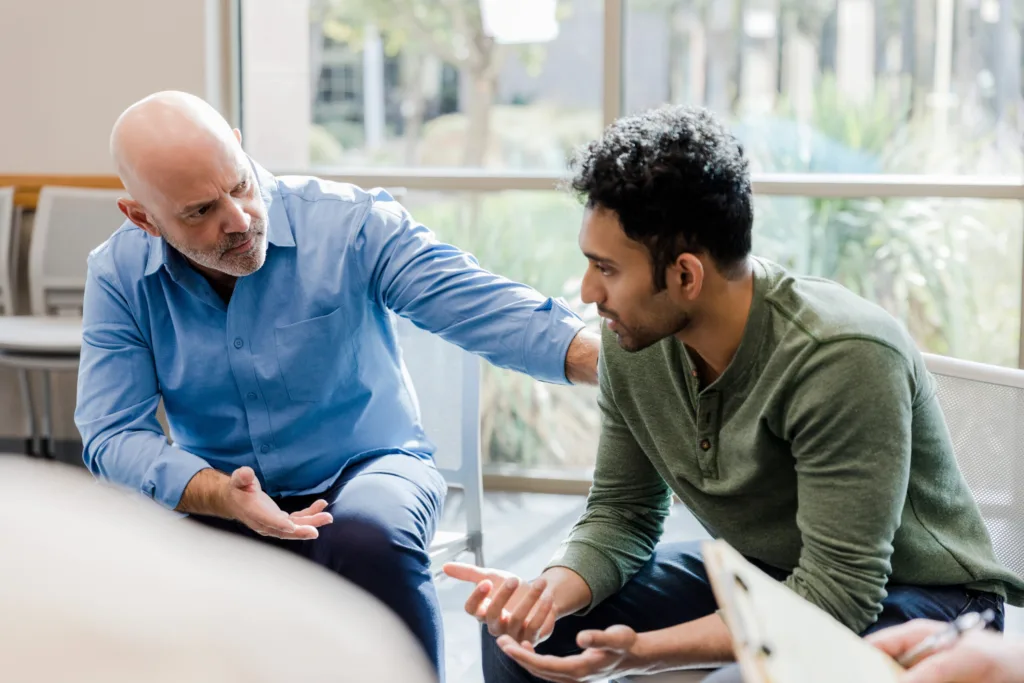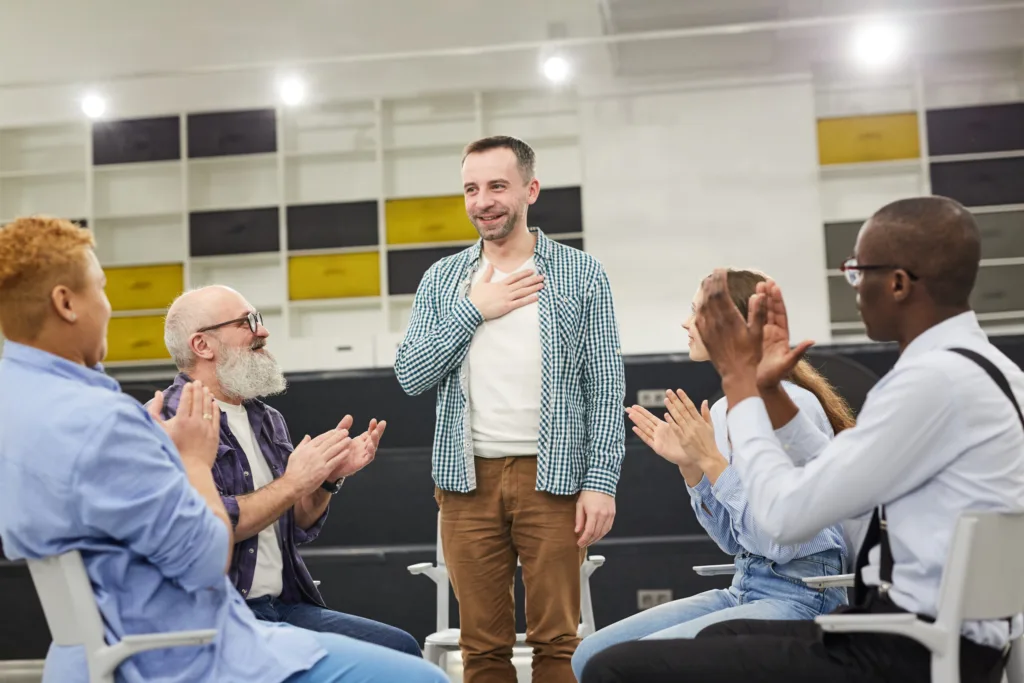Mental Health and Substance Use Support for Veterans

Veterans can face several challenges coming out of service, such as readjusting to civilian life and reintegrating with family, finding employment and enduring higher rates of mental health and substance use disorders.
- In 2020, the suicide rate for veterans was 57.3 percent greater than non-veterans, according to Veterans Affairs
- A 2013 study from Psychiatry Research found that approximately 12 percent of veterans are diagnosed with generalized anxiety disorder, which is 4-6 times higher than the general population
- 2-out-of-10 veterans have substance use disorder (SUD)
- Almost 1-out-of-every-3 veterans seeking treatment for SUD also has PTSD
- 32 percent of veterans with combat casualties develop PTSD
Identifying your own needs, finding resources, asking for help and navigating paperwork can feel frustrating and overwhelming on their own, but doing so while also navigating mental health and substance use disorders can feel hopeless. Outlined below are some resources for veterans who may need help with mental health, addiction or substance use, starting with applying for benefits with the VA.
If you are a veteran who needs help navigating the VA or accessing benefits, please call our admissions specialists at (866) 249-0840. We have extensive experience with VA services and getting veterans access to the care they need and deserve, even if that care is outside of our facilities.
Find Your Local Veterans Affairs Office
Finding your local VA is often the first step that veterans need to take. Clicking this link will take you to the VA’s search engine to find VA resources near you. Searching by zip code will also help you find the nearest VA healthcare, emergency services and more. Clicking here will take you to another way to search for services, where you can find all services offered within each state. If you haven’t applied for veteran benefits, you can do that by visiting this page. Here you’ll find instructions on how to apply online, over the phone, through mail or in person. To learn more about VA benefits and review frequently asked questions, click here.
Get to know your benefits and transition support services offered through the VA. The VA offers programs for pre- and post-separation and also has Transition Assistance Programs (TAPS) that offer financial and legal information, transition counseling and job assistance.
To access substance use treatment through the VA, click here.
To access mental health treatment through the VA, click here.
The VA has several other sources on its Resources and Support page. You can search by keyword or browse through topics such as disability, education and training, healthcare, decisions and appeals and more.
The Veterans Affairs Community Care Network (VA-CCN)
The VA-CCN is a network of facilities that are not operated by the VA and accepts veteran benefits, giving veterans more convenient access to mental health and substance use treatment. The Community Care Network (CCN) uses industry-standard practices and guidelines to administer treatment and promptly pay for services. To secure funding for treatment through the VA-CCN, both authorization from the VA and a doctor’s referral are required. These are usually obtained by visiting your home county VA office to meet with a primary care doctor to obtain a referral to a specific facility for treatment. Click here to learn more about the VA-CCN.
The Pyramid Healthcare system has several sites across four states that are part of the VA-CCN and accept TRICARE insurance, providing veterans and their families with a full continuum of care. Below are the Pyramid Healthcare facilities in the VA-CCN.
Charlotte, NC
Freedom Detox offers medically-monitored inpatient withdrawal management for adults.
Pyramid Healthcare Pennsylvania
With several locations throughout the state of Pennsylvania, Pyramid Healthcare offers withdrawal management and residential and outpatient treatment for adults and teens with substance use and co-occurring disorders.
Pyramid Military Therapy & Recovery Programs
Dallas, PA
This veteran-specific residential program treats substance use and co-occurring disorders.
Augusta, GA
Named one of the best addiction treatment centers in Georgia by Newsweek, Bluff is a detox and residential program for adults that treats substance use and co-occurring disorders.
Poconos, PA and Fletcher, NC
Our PA location is a residential program for women that treat primary mental health and co-occurring disorders, and Fletcher provides adolescent behavioral healthcare with residential and outpatient programs.
Pittsburgh, PA
Silvermist is a residential treatment for men with mental health, substance use and co-occurring disorders.
Asheville, NC
Catered to the unique needs of midlife adults (35+), this residential program treats substance use disorders.
New Jersey
This outpatient program treats adults, adolescents and tweens with mental health, substance use and co-occurring disorders.
Asheville, NC
Real Recovery provides outpatient treatment for men with substance use and/or mental health disorders.
Throughout southeastern Pennsylvania
The Light Program provides outpatient treatment for adults and adolescents with mental health disorders across 10 locations.
Asheville Area
October Road has three locations in Asheville and the surrounding area that treat substance use disorders in adults with outpatient treatment.
Camaraderie and Peer Support
One of the hardest transitions to make when returning to civilian life is losing the camaraderie instilled during service. While family and friends may provide excellent support and love, they may not fully understand what it’s like to serve and to transition. Connecting with other veterans can give you invaluable support and, in turn, you can provide support for someone else. Veterans Affairs has a list of national veteran service organizations here. You can also search for local veteran meet-ups and groups in your area. These organizations do not directly support veterans who are in treatment for substance use or mental health disorders, but having a strong social support system is important at any stage of life and can be vital when in recovery.
Peer Support
Peer support is an evidence-based program where veterans support each other as they manage an array of challenges such as substance use, returning to civilian life, mental health disorders, PTSD and more. Programs may be group-based or one-on-one and employ a certified peer specialist who is experienced in the unique challenges that veterans face.
These groups provide connections between veterans in a moderated environment that may not be available in traditional peer support groups as they navigate challenges and disorders that stem directly from their military service. Through open dialogue and a supportive environment, peer support allows veterans to learn from other service members who are also pursuing recovery. Pyramid Military Therapy & Recovery Programs has a dedicated peer support program built into our treatment.
Pyramid Military Therapy & Recovery Programs treat substance use disorders and co-occurring disorders. At our facility, located in Dallas, PA, we offer individualized treatment plans consisting of evidence-based treatment modalities and experiential services to treat the whole person.



